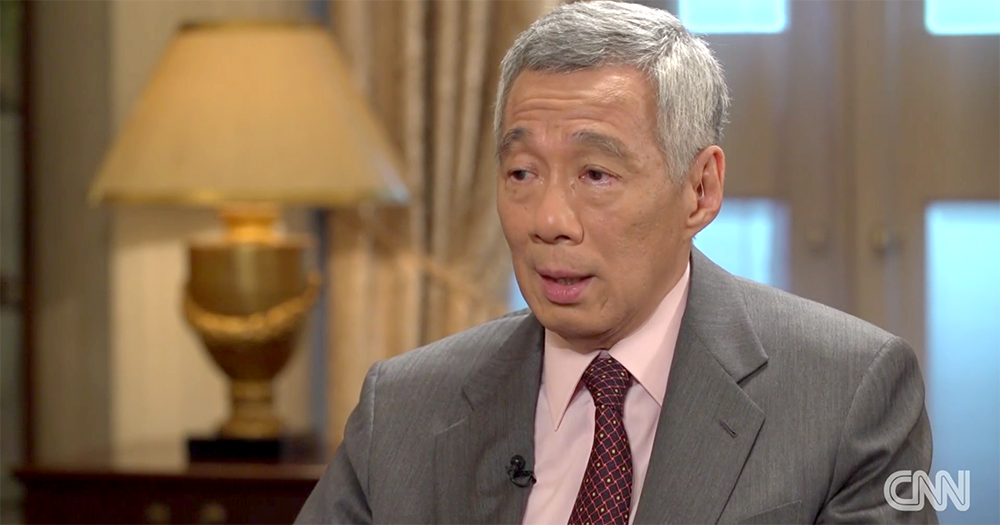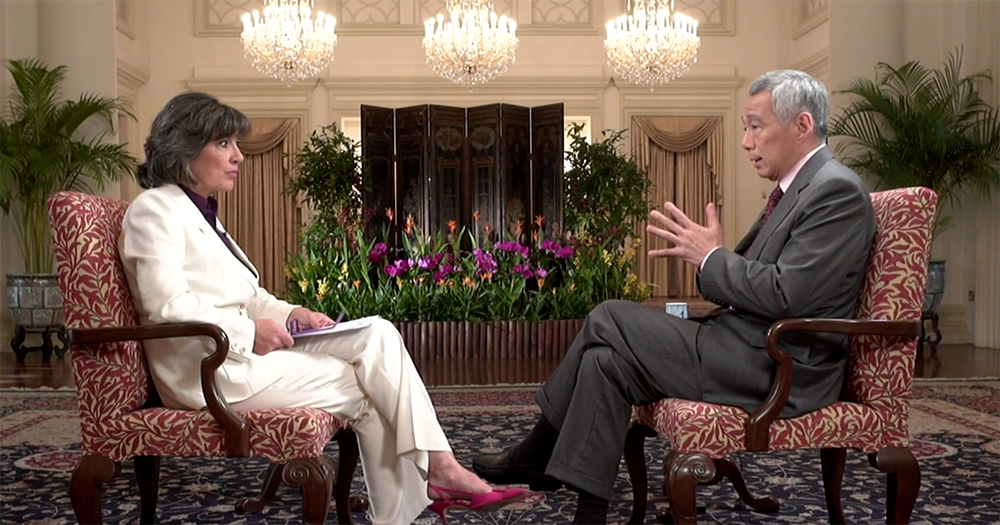Prime Minister Lee Hsien Loong gave an interview to seasoned CNN journalist Christiane Amanpour a day before the June 12 Trump-Kim summit.
The video interview, which ran for almost 23 minutes, was aired on June 11.
The wide-ranging topics saw PM Lee speak about world issues, Singapore's place in the international arena, trade, and of course, the historic Trump-Kim summit.
The full transcript is available here, but here's what PM Lee had to say about Kim Jong-un, Donald Trump and Singapore's place in the world:
On Kim Jong-un
Christiane Amanpour (CA): I would like to ask you, what did you take away from [the meeting with Kim]? What did he say to you about this moment, about a potential shift in the North Korea’s trajectory?
Lee Hsien Loong (LHL): He is a confident, young leader. He came, and he said thank you for hosting and we hope that it will be a historic occasion. I think he wants to go on to a new path. What he is prepared to deal, and how the agreement can be worked out – well that is a complicated matter. I think he has an intention to do something, and that is why he is meeting Donald Trump.
On Donald Trump
CA: I think everybody around the world has been quite stumped by the rhetoric, the tweets, the whole atmosphere around the G7 Summit, about how he behaved to his allies, about the name-calling on Twitter afterwards. Which Trump were you prepared to meet and which Trump did you meet for lunch?
LHL: I think it is the same Donald Trump whom I have met on previous occasions. He speaks his mind, he has his take – he has his very firmly-held views on trade, on the way America is being taken advantage of, and the way he wants to make America great again. I understand that that is what he stood for, that is why he was elected President.
On the importance of hosting the summit
CA: How important is it for Singapore to be hosting this summit?
LHL: We are the host, we are the tea and coffee pourers. We do not participate in the summit, we do not have an influence on what is discussed or the outcome, but we hope that by providing a venue which is neutral, which is agreeable to both sides, we enable a productive summit to take place which will turn around the negative trend of events in Korea over the last few months and set Korea on to a new and positive trajectory – for them and for the world.
CA: [Kim] is quoted to say that this was being arranged like a family affair. He seemed to be really complimentary. He said that this could be Singapore cementing itself in the history of peace and prosperity.
LHL:Well, he was being generous in his opening remarks. We are just the host. It is an opportunity for the two sides to meet, we provide a safe place, we ensure that the security is arranged, we make sure that the world can be here. We hope that in this environment, they will have a sense of the way the region is, the potential for the prosperity, stability and security in the region, in Asia, and what that can mean for the world. And therefore a sense of the responsibility they have – the two sides – to come to some kind of a constructive outcome.

On how Singapore was chosen
CA: Finally, how did [the summit] come about? Did you get a phone call? How was Singapore chosen for this Summit?
LHL: I do not know how the decision was made. We know that they were looking at possibilities and they sounded us out. We said, well, if you think we can be a good venue, we are prepared to step up, and we will be helpful. Then we did not hear anything more for a while. After some time, they narrowed it down and eventually they said, “Yes, we would like to come to Singapore,” which I presumed both sides said, “Yes, we would like to come to Singapore” because this is a joint decision. So we started preparing. Then the Summit was off, but we did not call off our preparations, and the Summit is on again, and we think we will be prepared by the time it happens.
[related_story]
Coming to the end of the interview, the inevitable questions about chewing gum and freedom of speech popped up, like clockwork:
On Singapore's lack of freedom of speech
CA: So I do want to ask you, because we are in an era of popular pushback. We see it all over the world. We saw it in the Arab Spring, we saw it in the populist ways which we have just been discussing, whether it is United States, whether it is Brexit, whether it is around Europe or elsewhere. You do have a pretty strict internal logic to Singapore. You have made a little bit of liberalisation in terms of some areas of free speech and others, but not dramatic political plurality. Where do you think Singapore is going? Do you see any flexibility in the future? Can you open up more?
LHL: I think when you say “strict internal logic”, it is rather a loaded term. Because what you really mean is: why are we so repressive? The answer is we are not. Why is the political scene like that? Because that is the way Singaporeans have voted and it is an outcome of the elections. When does it change? It changes when the Singaporean electorate decides that this Government is not serving their interests, ceases to support this PAP team, and perhaps hopefully supports another team which will serve them better. And then it will be a different scene. It is not that we are clamping down and preventing other people from contesting elections. In the last election, every single seat was contested. If you look at the popular vote, we had 70 percent of the popular vote. So I don’t think you can say it is because...
CA: There is not a whole lot of tolerance for freedom of speech or public protest.
LHL: You can say anything you want. You can ask me anything you want.
CA: Last autumn you prosecuted an activist Jolovan Wham for holding public activity without a permit, including one that included the famous Hong Kong activist Joshua Wong. So again, these are political, cultural, democratic questions.
LHL: No, there are arrangements. There is a Speakers’ Corner – actually it is an enormous speakers’ field – anytime you feel you want to relieve your soul of some important thought, you can go there and spout forth. But if you insist on going places you are not supposed to do this, then the rules will have to apply. You want to put stuff up on the Internet, you can publish anything you want. The blogs are there; they exist in multiples. You are still subject to the laws of sedition, libel and contempt, but you say what you want. And people do say whatever they want. If you research what is written, you will see that actually there is quite a lively discussion.
[related_story]
On Michael Fay and chewing gum
CA: You may laugh, you may not laugh. But when I came here, when I told people I was coming here, they wanted to know whether you still got very strict chewing gum and spitting rules. They remember the American who was very heavily penalised for chewing gum.
LHL: Yes, we caned him. He was not heavily penalised for chewing gum.
CA: He was caned?
LHL: Michael Fay was not [caned] for chewing gum. Michael Fay went around vandalising vehicles, scratching vehicles and causing a lot of damage. And he was caned for that. You do not get caned for chewing gum.
However, the interview has been viewed as not hard-hitting enough.
CNN’s @CAmanpour with Singapore PM at #TrumpKimSummit, joins long list of foreign journalists who try to ask tough questions. But no local knowledge means no sharp follow-ups, so PM gets an easy ride. No substitute for a free local press. View from 19:15 https://t.co/RNhZsJqCSb
— Cherian George (@cheriangeorge) June 12, 2018
You can view the complete transcript of the interview here and watch it here.
Top image via CNN
If you like what you read, follow us on Facebook, Instagram, Twitter and Telegram to get the latest updates.
